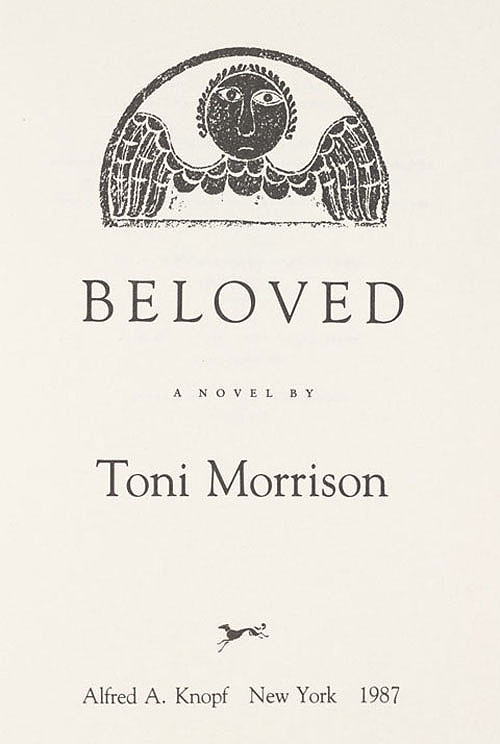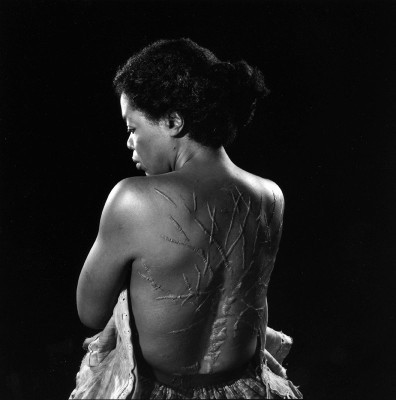If Senator John Conyers ever gets H.R. 40 passed, a law he raises every senate session that allocates money to the study of the legacy of slavery and an assessment of reparations, Beloved by Toni Morrison should be at the top of the reading list.
Yes, Beloved is entirely fictional, though the story is loosely based off a bit of American slavery legend; a woman faced with returning to slavery because of the fugitive slave act, decides to kill her children rather than give them up. The legend is often alluded to as the stuff of rebellion, the ultimate rebellious act in the face of slavery; the destruction of one's own children in an effort to prove they belonged to no man. It's a story for martyrdom referenced in pop culture, from Nina Simone to Talib Kweli. Yet Morrison explores this idea, shattering the mythos of the martyr in favor of a far more haunting and vulnerable story. She delves into the narrative; humanizing both the mother, Sethe, and victimized child, Beloved, in a novel essentially about belonging.
While Sethe and Beloved are the center of the narrative, it is essentially about a community of former slaves escaped to Ohio, who are nothing but haunted by their former bondage. And Morrison knows how to haunt her characters. It's obvious slavery consumes all as the book drifts from present plot points and conversations into glimpses of perverse images - a man burning, a mentally broken slave, a hanging woman - all images of a former life at a Kentucky plantation called Sweet Home. If a character is walking or talking, deep in reverie or simply cooking a meal, the scene quickly devolves into vivid depictions of abuse, escape, and the pain reserved only for survivors of the very worst genocides history has to offer. The potency of these memories is proof enough that Morrison can write in a stunning and unrivaled way, she may be the only writer capable of truly humanizing the legacy of slavery. At any rate, she accomplishes something no non-fiction book on the topic could ever really do.
One of the demonstrations of Morrison's ability is the way she makes belonging a central theme. It is only later that we realize the burning man is a friend, the broken slave a husband, the hanging woman, a mother. The reason we, the reader, aren't greeted with these facts immediately is because Morrison is exploring what slavery teaches about belonging (it is no coincidence the villain in Beloved is named Teacher, the chief overseer at Sweet Home). If this book were non-fiction the thesis would essentially ask what happens to one's sense of belonging when they belong legally to another person. There is so much helplessness in Beloved, an eager desire to own oneself, the product of one's labor. Even the word beloved is used to refer to a cherished and treasured individual, someone who belongs to us. While this seems like it could quickly break down into common sense, to the obvious notion that slavery was bad for the individual slave psyche, it is Morrison's complete mastery of storytelling, of painfully interrupting the reader that keeps the reader entrapped.
And it isn't always violence the way many stories of slavery and racism must almost necessarily be. Morrison has proven it is possible to use imagery alone to jolt the reader, remind them that they are never in a safe space. One of my favorite examples of this is when Denver, one of Sethe's daughters, the only one born free, is at the home of a Dutch brother and sister who are considered "good whites", true champions of abolition. Denver is there asking for a job, but before the reader can feel too comfortable:
"Denver left, but not before she had seen, sitting on a shelf by the back door, a blackboy's mouth full of money. His head was thrown back farther than a head could go, his hands were shoved in his pockets. Bulging like moons, two eyes were all the face he had above the saying red mouth. His hair was a cluster of raised, widely spaced dots made of nail heads. And he was on his knees. His mouth, wide as a cup, held coins needed to pay for a delivery or other small service, but could just as well have held buttons, pins or crab apple jelly. Painted across the pedestal he knelt on were the words 'at yo service'"
This is all we see of the doll, but Morrison doesn't arbitrarily place it in the house of the only friendly whites in the novel. It is a simple yet vivid reminder that racism penetrates everywhere. This image isn't for Denver to see, but the reader. We are all familiar with the sambo, the helpless and stupid black boy that needs the white man to lead them. We know the depiction of sambo is the bulging white eyes and the red mouth. The isolated sentence describing him on his knees and the simplistic 'at yo service'. This was meant to haunt the reader even as something good starts developing for a truly lovable character.
Beloved is deeply disturbing, it's uncomfortable, it's unbelievability is unsettling and doesn't detract from the power with which Morrison writes. Many critics compare her to Faulkner in style, this is true and she compounds on it elegantly. But in content, Toni Morrison is truly one of a kind, writing humanity into a horrifying moment in history and shaming us deeply for forgetting it was ever there.


No comments:
Post a Comment